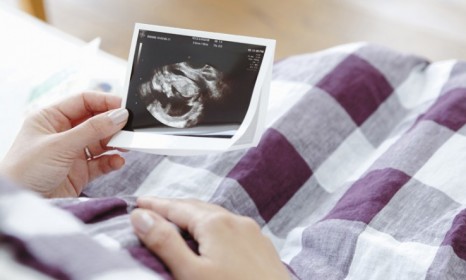An anti-miscarriage drug's 'disastrous' effect?
An early artificial estrogen used by pregnant women in the mid-20th century has been linked to cancer, and a study suggests that new generations may still be at risk

A free daily email with the biggest news stories of the day – and the best features from TheWeek.com
You are now subscribed
Your newsletter sign-up was successful
A popular anti-miscarriage drug used between 1940 and 1960 has been linked to breast cancer, infertility, and a host of other health problems in the daughters of women who used it while pregnant, according to a study in The New England Journal of Medicine. Researchers even suspect it could cause reproductive health issues in the granddaughters of women who used it. What was this drug? And who's at risk now? Here's what you should know:
What is it?
The drug — DES, or diethylstilbestrol — is a synthetic form of estrogen that was often prescribed in the United States and Europe. It was intended to help pregnant women avoid miscarriages and premature childbirth. DES was discontinued in 1971 when studies found not only that it didn't work, but that women whose mothers had taken the drug had a higher risk of a rare kind of vaginal cancer and 11 other reproductive issues, including infertility, spontaneous abortion, neonatal death, and invasive breast cancer.
The Week
Escape your echo chamber. Get the facts behind the news, plus analysis from multiple perspectives.

Sign up for The Week's Free Newsletters
From our morning news briefing to a weekly Good News Newsletter, get the best of The Week delivered directly to your inbox.
From our morning news briefing to a weekly Good News Newsletter, get the best of The Week delivered directly to your inbox.
Who might have been exposed to it?
More than 2 million women and 2 million men in the United States are thought to have been exposed to the drug in the womb. And many women over 40 may not even know of their risk, or realize their mothers took the drug. The study concluded that women exposed to DES in utero were twice as likely to develop breast cancer by age 55. There is also evidence suggesting that men who were exposed might face an elevated risk of testicular problems like cysts.
How worried should those who were exposed be?
This doesn't mean DES daughters are doomed, says Rosie Mestel in the Los Angeles Times. "If the absolute risk is low, double the absolute risk is still low as well" (breast cancer risk, for example, jumped from 2 percent to 4 percent). But don't be complacent, as "the drug's disastrous effects are long reaching and devastating," says Gloria Ryan at Jezebel. Even the granddaughters of women who took the drug may be at risk. It remains to be seen how the study's findings will affect lawsuits against the drug's manufacturers underway in Massachusetts. But doctors say suspected DES daughters should be "vigilant when it comes to breast cancer screening."
A free daily email with the biggest news stories of the day – and the best features from TheWeek.com
Sources: New England Journal of Medicine, LA Times, NY Daily News, Jezebel, Boston Globe
-
 Film reviews: ‘Send Help’ and ‘Private Life’
Film reviews: ‘Send Help’ and ‘Private Life’Feature An office doormat is stranded alone with her awful boss and a frazzled therapist turns amateur murder investigator
-
 Movies to watch in February
Movies to watch in Februarythe week recommends Time travelers, multiverse hoppers and an Iraqi parable highlight this month’s offerings during the depths of winter
-
 ICE’s facial scanning is the tip of the surveillance iceberg
ICE’s facial scanning is the tip of the surveillance icebergIN THE SPOTLIGHT Federal troops are increasingly turning to high-tech tracking tools that push the boundaries of personal privacy